Energy saving advice
Preparing homes for EV chargers
31 May 2022 • 4 minutes


Electric vehicles (EVs) signal a new way of living: not only are they much better for the environment, with a reduction in both the use of fossil fuels and the carbon emissions they create, but they’re also making us more self-sufficient. We don’t have to keep an eye on the fuel gauge, or use up more fuel trying to find the best pump prices – all we need to do is plug in the car when we get home. And with more and more charging points becoming available across the country, it’s becoming much easier to travel longer distances too.
But lots of us use our cars for shorter journeys: to and from work, going shopping or visiting friends and family nearby. This is where having an EV charger at home makes it as easy to “fill up” your car as it is to charge your mobile.
The short answer is – you don’t! You need a certified specialist company to install your charging point. You’ll pay for the charging point and the installation and that’s it; from then on you’ll only pay for the electricity you use when charging your car.
Before you book your installation you’ll need to decide where you want your charger to go. As the name suggests, the charging point will be attached to a wall! It’s a good idea to pick a spot close to where you park your car – in a garage or on a driveway is best, as the cable is less likely to create a hazard. If, like millions of car owners, you park on the road you can still charge your car from there, but check with your council first as you may need to take extra precautions, so people don’t trip over the cable on the pavement.
You also need to decide which type of charger you want. The main choices are between a tethered or untethered charger – the tethered option comes with the charging cable attached, whereas with the untethered version you have a plug socket and use your car’s cable to connect to the charger.
An untethered cable might be an alternative if you’ll be using a number of different charging points (while you do your shopping perhaps, or when you’re at work), or if you have a type 1 charger vehicle. In general though, it’s just a matter of which one you prefer.
It depends on how fast you want your car to charge! Your home EV charger will usually charge your car at 3.6kW or 7kW, which will give you 15-30 miles of driving range for every hour you charge it. Compare that with the 2.3kW you’d get from a 3-pin plug – it would only give you about 8 miles-worth of driving over the same amount of time!
Many people use their EV charger in much the same way as a mobile phone charger, charging it up to 85% overnight and then plugging it back in as and when they need to in the day. You may also find that your electricity is cheaper in the wee small hours, so charging your car while you sleep could save you money! And don’t worry if it reaches capacity while you’re still snoozing – the charger will automatically switch itself off.
You’ll need to have an electricity supply to your home and a spot on your house which is close to where you park your car. If you park on the road you can still use a charging point on your house, but check with your council first.
No you can’t – you need to be a certified installer, so this isn’t a DIY job! Suppliers generally offer a supply and install package, but it’s useful to be at home during the installation as the engineer can talk you through how to use the charging point.
You don’t need planning permission to install your charger, but the tradesperson installing your charger will need to inform the district electric network supply company. This doesn’t stop charger installation at the moment, but could do so in the future if regulations change.
Yes, it is possible to use a 13 amp socket, but it will be much slower than if you use an EV charging point. It’s generally unadvised you to use a normal plug socket, but it is possible as a temporary measure if there are no other charging points available.
Our help & advice articles cover Plumbing, Home heating, Electrical, Energy-saving and Home maintenance.